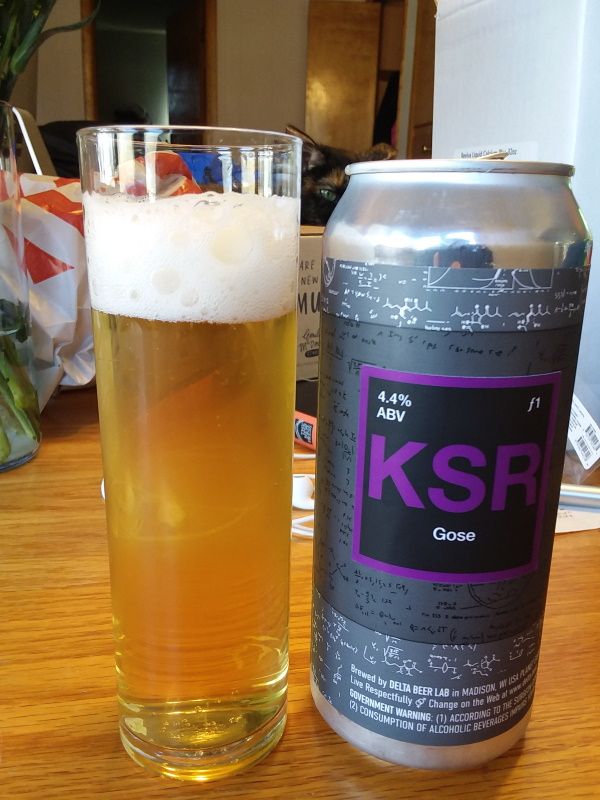That shrimp recipe called for coriander and so it's a good
time to return to the seeds of the Coriandrum sativum plant which were the
genesis of this mess in the first place. It also allows me to make good on
actually making a trip to Delta Beer Lab, something I figured was a swell idea
back in December when I reviewed a cranberry gose and lamented the paucity of the
unfruited variety of the beer. While Delta's beer is on store shelves, I've only
seen their mango gose and not their gose gose at my local bottle shop. Granted,
it took four months but I finally lost my Delta Beer Lab virginity.
The gose is a sour wheat beer that originated in the German
town of Goslar at some point in the Middle Ages. Water sources apparently gave the beer a
bit of salinity and it was flavored with coriander. What I think of as less
reliable sources say the High Middle Ages but ones I trust more dates it to the
Late Middle Ages. For a long while it was a local delicacy until the first half
of the 18th century when it made its way to neighboring Leipzig
where the inhabitants took to the beer style like a junkie to the needle. While
popular for a good, long while, drinkers would turn away from it more and more
as the years progressed with World War II and the Cold War doing it no favors. Eventually
it died out in 1966. But 20 years later it was revived in Germany and seems to
be hanging on to dear life in its homeland with a handful of German breweries
making it.
Gose became something of a trend for American craft brewers
around 2013 or so. I don't have numbers but it seems that it is less popular
today. Even if true, there are still examples of the beer that are easily available
such as Otra Vez (which has been reformulated, I see) from Sierra Nevada,
Kirsch Gose by Victory, and a variety of gose iterations from Anderson Valley with
their Blood Orange probably being the most well-known of them. I suppose it's
arguable whether a gose remains a gose if you add citrus fruit, cactus,
or agave to it in lieu of coriander. The addition of salt to a kettle soured beer is pretty much all
it takes to be a gose in the States today, it seems. But the fact remains that Sierra Nevada has a beer
on shelves year-round that says "Gose" on the packaging which is a lot of visibility for a beer style that was all but dead not long ago.
I have nothing against the fruited gose per se and have enjoyed
those beers listed above, but in the rush to make everything that isn't an imperial
stout taste fruity (the stouts get laced with lactose, coffee, vanilla, and so
on), American brewers have made the ordinary non-fruited variety something of a
rare bird. This is a shame because I am rather partial to coriander.
Thankfully the folks at Delta Beer Lab offer a more
traditional take on the style in addition to one that's in the cult of tropicality.
It smelled first and foremost of that lemony sour from the
lactic acid which gives the beer its sour taste. I also caught a little coriander
and just a wee bit of sweetness – like honey.
While I have had beers that were more sour, Delta did not
skimp on it here. It was very sour but fell short of a xenomorph blood level of acidity, thankfully. As
you can imagine, it was good 'n fizzy with the salinity having an almost spectral
presence. It didn't taste salty but I could tell it was there enhancing the
other flavors. It adds a certain overall fullness. The coriander wasn't prominent but was there playing its role in
generating tastiness. Some wheat and a slight grainy sweetness rounded things
out. With all that sourness, some lingered on the finish and made it rather dry
but I was also left with a wheaty taste and I could just discern some salinity
too.
As Darth Vader once remarked to his son, impressive.
I really enjoyed this beer. It was good and sour, it had
just the right amount of salt to enhance flavor, and a goodly amount of
coriander. That is, I would have been happy with just a smidgeon more of the spice
but it complemented the wheat very well and was still quite tasty.
Junk food pairing: I recommend pairing your Gose with some Carada
rice ball cuttlefish flavored snacks. The beer's citrus sour complements the
cuttlefish flavoring while also acting as foil to the snack's sweetness.


No comments:
Post a Comment